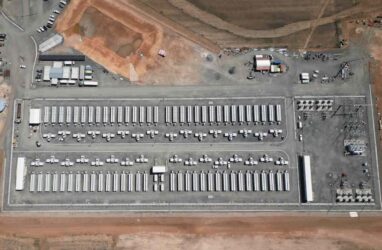Feed aggregator
Labor girds for tricky fight for green hydrogen tax credits in last week of parliament
The post Labor girds for tricky fight for green hydrogen tax credits in last week of parliament appeared first on RenewEconomy.
South Australia’s biggest battery charges up as new wave of storage prepares to enter grid
The post South Australia’s biggest battery charges up as new wave of storage prepares to enter grid appeared first on RenewEconomy.
As Cop29 wraps up and the climate crisis gathers pace, Australia’s dash for gas is confounding | Bill Hare
Nearly all observers believe Chris Bowen is strongly committed to action. Most agree that can’t be said for his party
Cop29 in Baku has concluded but its outcome is disappointing – in many dimensions. Its decisions on finance – agreeing that the developed world would provide US$300bn a year by 2035 – come nowhere close to what’s needed. Ultimately, it may even be poisonous because of its lack of ambition and muddled scope – it does not even cover loss and damage.
Baku saw little sense of urgency or increased climate action, despite the universal message from scientific studies, including the Climate Action Tracker. Our global update this year found that in the last three years there’s been virtually no improvement in either action on the ground, nor ambition to take action in the future. And this is despite a series of seemingly never-ending, global warming-linked deadly catastrophes unfolding around the world.
Continue reading...COP29: Reactions to the new Baku Finance Goal, Article 6 deal
‘Divorce’ in songbirds: extreme weather pushes couples past breaking point
Green hydrogen could decarbonise entire industries in NZ – but there’s a long way to go
The Guardian view on Cop29: poor-world discontent over a failure of rich countries to deliver | Editorial
A rushed final text in Baku strains trust between nations, as inadequate climate finance commitments leave vulnerable countries calling for justice
The hasty imposition of a deal at the UN climate conference, Cop29, in Azerbaijan, over the objections of poorer nations has fractured global trust and undermined recent progress. This was supposed to be the “finance Cop” when two dozen industrialised countries – including the US, Europe and Canada – promised to pay developing nations for the damage caused by their rise. Instead, developing nations – led by a group including India, Nigeria and Bolivia – say this weekend’s agreement for $300bn a year in 2035 is too little, too late. Worse, rich-world governments will be able to escape their obligations by being able to rely on cash from private companies and international lenders.
Independent experts say the developing world, excluding China, would need $1.3tn a year by 2035 to fund its green transition and keep temperature rises in line with the Paris agreement. The climate finance target, pushed through by the Azerbaijani chair, is described by poor nations as a death sentence for those already drowning under rising seas and facing devastating costs.
Continue reading...Cop29 climate finance deal criticised as ‘travesty of justice’ and ‘stage-managed’
Some countries say deal should not have been done and is ‘abysmally poor’ compared with what is needed
The climate finance deal agreed at Cop29 is a “travesty of justice” that should not have been adopted, some countries’ negotiators have said.
The climate conference came to a dramatic close early on Sunday morning when negotiators struck an agreement to triple the flow of climate finance to poorer countries.
Continue reading...Huge deal struck but is it enough? 5 takeaways from a dramatic COP29
Huge deal struck but is it enough? 5 takeaways from a dramatic COP29
Deal or no deal: can Labor avoid an ‘end-of-year dumpster fire’ and pass its legislative agenda? | The Agenda
If Peter Dutton senses an opportunity in blocking bills in the lead-up to an election, he might just take it
- Follow our Australia news live blog for latest updates
- Get our breaking news email, free app or daily news podcast
The final parliamentary sitting week of the year is here!
That odour you’re smelling is drip filter coffee to fuel late-night Senate votes and the faint whiff of desperation to pass as much of the government’s legislative agenda as possible.
Sign up for Guardian Australia’s breaking news email
Continue reading...Developing countries condemn 'insufficient' Cop29 deal – video
Rich and poor countries concluded a trillion-dollar deal on the climate crisis in the early hours of Sunday morning, after marathon talks and days of bitter recriminations ended in what campaigners said was a 'betrayal'.
Continue reading...Cop29 showed climate progress can survive a Trump presidency – despite a disappointing deal | Geoffrey Lean
Away from the brutal main negotiations, there were important strides forward. The science can – and must – rise above politics
The resolutions reached at Cop29 on tackling the climate crisis, in the early hours of Sunday morning, are gravely disappointing but much better than nothing. And “nothing” was almost the result of this climate conference in Baku.
The deal falls a long way short of hopes at the start of the climate summit, and even further behind what the world urgently needs. But coming after negotiations that frequently teetered on the very edge of collapse, the result does keep climate talks alive despite Donald Trump’s second coming, and has laid the first ever international foundation, however weak, on which the world could finally construct a system of financing poor countries’ transition away from fossil fuels.
Continue reading...Cop29’s new carbon market rules offer hope after scandal and deadlock
Countries agree on how to create, trade and register credits to meet climate commitments
It was once among the most promising ways to funnel climate finance to vulnerable communities and nature conservation. The trading of carbon credits, each equal to a tonne of CO2 that has been reduced or removed from the atmosphere, was meant to target quick, cost-effective wins on climate and biodiversity. In 2022, demand soared as companies made environmental commitments using offsets, with the market surpassing $2bn (£1.6bn) while experiencing exponential growth. But the excitement did not last.
Two years later, many carbon markets organisations are clinging on for survival, with several firms losing millions of dollars a year and cutting jobs. Scandals about environmentally worthless credits, an FBI charge against a leading project developer for a $100m fraud, and a lack of clarity about where money from offsets went has caused their market value to plunge by more than half. Predictions that standing rainforests and other carbon-rich ecosystems would become multibillion-dollar assets have not yet come to pass.
Continue reading...Flat-cap Clarkson only wants his nose in the trough | Stewart Lee
The broadcaster thinks if he fires up his farming fanbase they can shield him from his obligation to contribute his fair share to society
I read Andrew Michael Hurley’s new novel, Barrowbeck, in preparation for co-hosting Tales of the Weird, a timely event on the folk horror genre at the British Library earlier this month. I’m not the most informed commentator on this literary subset by any means, but I am, after Mark Gatiss, one of the most famous, and so I am often asked to pontificate about it. That’s the way the world works, I’m afraid. That’s why Hugh Dennis and David Baddiel are presenting a new show for Channel 4 about cycling across France, instead of the cyclist who cycled across France earlier this year and won the Tour de France cycling race, whoever he was.
Barrowbeck follows the fortunes of a Yorkshire hamlet, from an itinerant tribe making a pact with their gods 2,000 years ago, in which they promise to honour the land, to the near future of 2041. There, climate change has seen that same land flooded, some inhabitants holding on in hope as a cycle of life that stretched back millennia indisputably ends, as it will for all of us, sooner, it seems, rather than later. And these are the doomed lands our wealthiest farmers are taking to the streets to inherit (at half the inheritance tax anyone else would pay).
Stewart Lee tours Stewart Lee vs the Man-Wulf next year, with a Royal Festival Hall run in July. He is also a guest of all-female Fall karaoke act the Fallen Women, at the Lexington, London on 28 December
Continue reading...World will be ‘unable to cope’ with volume of plastic waste in 10 years, warns expert
Countries must curb production now and tackle plastic’s full life cycle, says Norwegian minister Anne Beathe Tvinnereim ahead of key UN talks this week
The world will be “unable to cope” with the sheer volume of plastic waste a decade from now unless countries agree to curbs on production, the co-chair of a coalition of key countries has warned ahead of crunch talks on curbing global plastic pollution.
Speaking before the final, critical round of UN talks on the first global treaty to end plastic waste, in Busan, South Korea, this week, Norway’s minister for international development, Anne Beathe Tvinnereim, acknowledged the split that had developed between plastic-producing countries and others. She represents more than 60 “high ambition” nations, led by Rwanda and Norway, who want plastic pollution tackled over its full life cycle. Crucially, this means clamping down heavily on production.
Continue reading...Climate deal too little too late, poorer nations say
Yes, there is a lot of greenwashing, but Cop summits are our best chance of averting climate breakdown | Ashish Ghadiali
Despite its imperfections the process of tackling the climate crisis will not be derailed, even in the face of US backtracking
It was never an indication of great things to come when the chief executive of Cop29, Elnur Soltanov, was filmed attempting to broker gas and oil deals for Azerbaijan in the slipstream of the past fortnight’s UN climate summit in Baku.
More than 1,700 fossil fuel lobbyists have been operating in and around Cop29, outnumbering delegates from the 10 most climate-vulnerable countries combined. Many, including Greta Thunberg, now argue that the UN climate process has been entirely hijacked by corporate interests, reduced to a global stage for greenwash.
Continue reading...From a US$300 billion climate finance deal to global carbon trading, here’s what was – and wasn’t – achieved at the COP29 climate talks
Cop29 agrees $1.3tn climate finance deal but campaigners brand it a ‘betrayal’
Deep divisions remain after high-stakes talks end with agreement to help developing world shift to low-carbon economy
Rich and poor countries concluded a trillion-dollar deal on the climate crisis in the early hours of Sunday morning, after marathon talks and days of bitter recriminations ended in what campaigners said was a “betrayal”.
The developing world will receive at least $1.3tn (£1tn) a year in funds to help them shift to a low-carbon economy and cope with the impacts of extreme weather, by 2035.
Continue reading...




